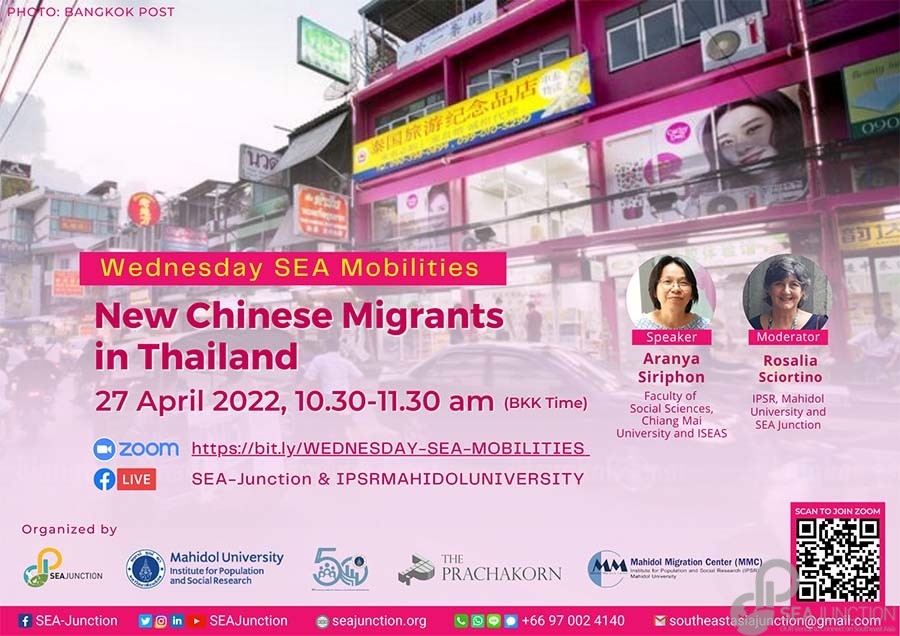
- This event has passed.
New Chinese Migrants in Thailand
27 April, 2022 @ 10:30 am - 11:30 am
SEA Junction in collaboration with IPSR In-House Seminar and Mahidol Migration Centre (MMC) has launched a series of bi-monthly events entitled ‘Wednesday SEA Mobilities’, starting in February 2022. The last Wednesday of every two months we will jointly hold seminars or panels discussing vast arrays of current Southeast Asia’s mobility issues by experts, academics, practitioners, NGO workers, migrants, and people from the fields.
Our second Wednesday SEA Mobility’s event on 27 April 2022 at 10.30-11.30 am will be a presentation by Aranya Siriphon on New Chinese Migrants in Thailand. The online event will be broadcast on Zoom at https://bit.ly/WEDNESDAY-SEA-MOBILITIES and also on the FB pages of IPSR and of SEA Junction.
Aranya Siriphon is Visiting Fellow at Regional Social and Cultural Studies Programme at ISEAS – Yusof Ishak Institute. She is also Associate Professor at the Department of Sociology and Anthropology, Faculty of Social Sciences, Chiang Mai University. Her presentation will be based on the paper submitted to ISEAS – Yusof Ishak Institute which can be found here and below is a brief abstract.
Abstract
Xin yimin, literally mean ‘new migrant’, refers to the new wave of skilled and urban migrants from China to Thailand after 2000s onward. Differentiated from new Chinese migrants who migrated to Southeast Asia and particularly to Thailand during 1990s-2000s, Chinese emigration emerged today is much more a form of class consumption, a strategic class reproduction that transforms economic capital into social status and prestige, rather than the previous migration for economic production.
The dynamic rise of China and the rapid economic growth associated with Chinese state influences, global flows of digital technology and transportation, and neoliberal contexts have fortunately supported the emerging migration trend. The new migrants’ aspiration and desire, seen as part of driving force, are involved in aiming to improve a better quality of life through outmigration for education, business, marriage, residential tourism and lifestyle.
Since the 2000s, many have been moving into Southeast Asia. In Thailand, their number has doubled in the last two decades. The new Chinese migration to Thailand today is of a more transient nature, a circulatory transnational migration seen as an unfinished set of fluid movements engaging in between the homeland and various host countries. Under the characteristic of migration trend, these new Chinese migrants to Thailand can be classified into four groups: The first consists of people who migrate for business and economic activities; China is the third largest investor in Thailand, mainly in the manufacturing sector, with Bangkok as the favored location. It also includes members of the staff working for official or private institutes, voluntary teachers, and professional freelancers. The second consists of individuals who migrate for education purposes, at all levels. Tertiary level students usually enroll in private institutions, mainly in Bangkok and Chiang Mai. The third consists of people migrating for a lifestyle change. Tourists fall under this category since some tend to eventually migrate to Thailand after being enamored by its lifestyle and culture. The fourth refers to migrants of the above categories who move on to engage in ecommerce businesses, selling Thai products and international brands to Chinese customers.

Please contact us at southeastasiajunction@gmail.com or phone: +66970024140 for information.
Organizers
SEA Junction
SEA Junction, established under the Thai non-profit organization Foundation for Southeast Asia Studies (ForSEA), aims to foster understanding and appreciation of Southeast Asia in all its socio-cultural dimensions, from arts and lifestyles to economy and development. Conveniently located at Room 408 of the Bangkok Arts and Culture Center or BACC (across MBK, BTS National Stadium), SEA Junction facilitates public access to knowledge resources and exchanges among students, practitioners and Southeast Asia lovers. For more information, see www.seajunction.org, join the Facebook group: http://www.facebook.com/groups/1693058870976440/ and follow us on Twitter and Instagram @seajunction
Institute for Population and Social Research (IPSR), Mahidol University
IPSR was established in 1971 and has become one of Asia’s premier population research and training hubs. The Institute conducts research and provides training in population, sexual and reproductive health and development with a focus on Thailand and on neighbouring countries in Southeast Asia, with the ultimate goal of improving the quality of life for all. For more information, see https://ipsr.mahidol.ac.th.



